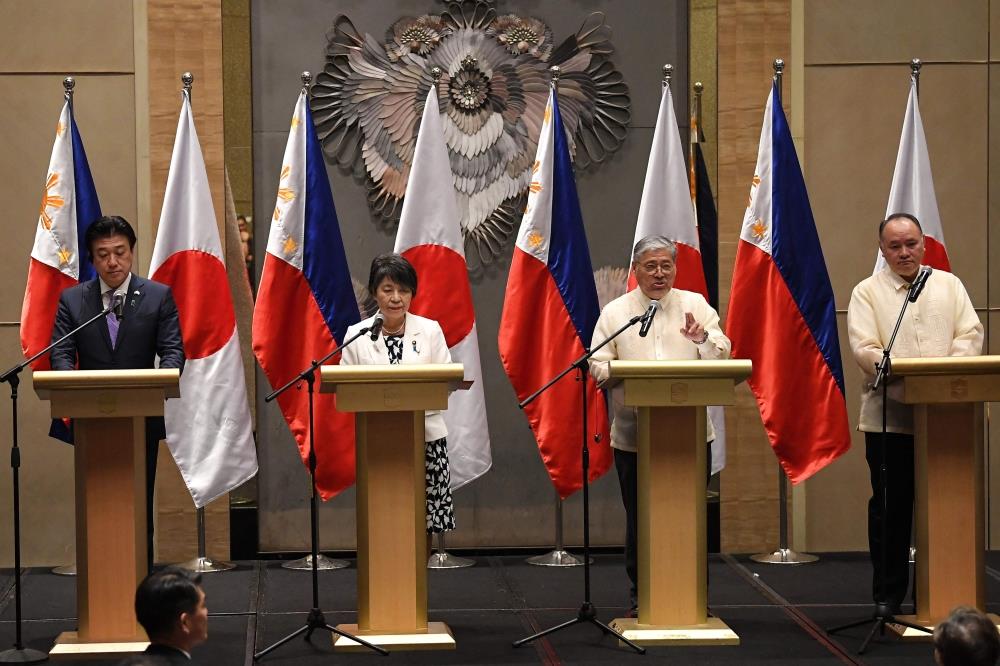
Philippines And Japan Sign Key Defence Pact
Manila: The Philippines and Japan signed a key defence pact on Monday that will allow the deployment of troops on each other's territory, as they boost ties in the face of China's growing assertiveness.
The Reciprocal Access Agreement (RAA) was finalised in Manila, where Japanese Defence Minister Minoru Kihara and Foreign Minister Yoko Kamikawa held talks with their Philippine counterparts Gilberto Teodoro and Enrique Manalo.
The accord, which Tokyo and Manila began negotiating in November, provides the legal framework for Japan and the Philippines to send defence personnel to each other's territory for training and other operations.
Teodoro and Kamikawa signed the agreement at the presidential palace. It will take effect once ratified by lawmakers in both countries.
The signing was "another milestone in our shared endeavour to ensure a rules-based international order, to ensure peace and stability in the Indo-Pacific and particularly in our region", Teodoro told reporters.
The Philippines and Japan are longtime allies of the United States, which has been strengthening its alliances from Canberra to Tokyo to counter China's growing military might and influence in the region.
Chinese officials have accused the United States of trying to create an Asia-Pacific version of NATO.
The signing of the RAA comes as China's sabre-rattling towards Taiwan and over the South China Sea fuels fears of a potential conflict that could drag in the United States.
There have been escalating confrontations at sea between Chinese and Philippine ships as Beijing steps up efforts to push its claims to nearly all of the strategic South China Sea.
The most serious happened on June 17 when Chinese coast guard personnel wielding knives, sticks and an axe surrounded and boarded three Philippine navy boats during a resupply mission to Second Thomas Shoal in the Spratly Islands.
A Filipino sailor lost his thumb in the incident.
Read Also-
Russian missiles kill 20 in Ukraine, gut Kyiv children's hospital
11 dead, 35 missing after Indonesia landslide
Three members of Cairo wedding party dead after car plunges into Nile
Tokyo and Beijing are also at loggerheads over disputed islands, controlled by Japan, in the East China Sea.
Chinese foreign ministry spokesman Lin Jian said the Asia-Pacific region did not need "military groups, let alone small circles that encourage a new Cold War and provoke confrontation".
Japan invaded and occupied the Philippines during World War II but the two countries have since grown closer due to trade and investment and, more recently, to counter a resurgent China.
Japan is a key supplier of security equipment and technology to the Philippines, including patrol vessels and surveillance systems.
Tokyo's ambassador to Manila, Kazuya Endo, flagged in a speech on Thursday "significant developments" in Japan's defence equipment supplies to the Philippines.
'Linchpin'
Tokyo has signed similar reciprocal access agreements with Britain and Australia in recent years.
Manila has equivalent pacts with the United States and Australia and plans to pursue one with France.
The Philippines has been a key focus of US efforts to build an arc of alliances, owing to its position in the South China Sea and its proximity to Taiwan, which China claims as its own.
Philippine support would be crucial for the United States in the event of any conflict.
Leaders from Japan, the Philippines and the United States had their first trilateral summit in April aimed at boosting defence ties in Washington.
It was held on the heels of four-way military drills that included Australia in the South China Sea, riling Beijing.
"Beyond our bilateral relations, Japan is also keen to deepen trilateral and quadrilateral ties, such as Japan, the Philippines, United States or Japan, the Philippines, United States and Australia," Japan's Kihara told reporters.
Japan, wary about possible future changes in US policy in the region, was seeking to play a larger role in security, analysts said.
"The Japanese would like to impress upon the Americans that Japan is the linchpin of US security presence, military presence here in the region, and of course, the most reliable ally of the United States," said Renato Cruz De Castro, professor for international studies at De La Salle University in Manila.

Legal Disclaimer:
MENAFN provides the
information “as is” without warranty of any kind. We do not accept
any responsibility or liability for the accuracy, content, images,
videos, licenses, completeness, legality, or reliability of the information
contained in this article. If you have any complaints or copyright
issues related to this article, kindly contact the provider above.

















Comments
No comment